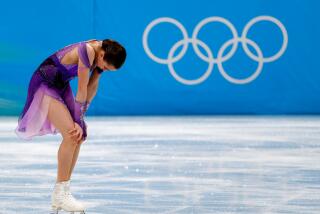Track Officials Await Review of Drug Tests
- Share via
The president of track and field’s worldwide governing body said Monday that authorities probably would know the results of a review of drug tests taken at last summer’s world championships in Paris in weeks, perhaps days.
Lamine Diack, president of the International Assn. of Athletics Federations, said the “green light” had been given to a French laboratory to retest the more than 400 samples. Officials are searching for evidence of a new designer steroid, tetrahydrogestrinone, or THG.
In a telephone interview, Diack called the discovery of THG last month by U.S. researchers “an important moment” for track and field, saying it offered proof of a stepped-up campaign by sports and governmental authorities against athletes’ use of performance-enhancing substances.
“This is the way to clean our sport,” he said.
Five track athletes reportedly have tested positive for THG, four Americans and Europe’s fastest sprinter, Dwain Chambers. In addition, half a dozen U.S. athletes reportedly have tested positive in recent months for the stimulant modafinil, among them sprint champions Kelli White and Chryste Gaines.
The positive tests for THG and modafinil were discovered as track and Olympic authorities continued to wrestle with the case of Jerome Young, a U.S. sprinter who tested positive in 1999 for the banned steroid nandrolone but was cleared to compete at the 2000 Sydney Olympics by a USA Track & Field appeals panel acting in secret. Young won a gold medal in Sydney as part of the U.S. men’s 1,600-meter relay team and only this year was identified as the athlete at issue.
The case is now under review by the IAAF and the International Olympic Committee, and Diack urged Young to turn over “all the information.”
Diack added, “It can be better for our sport and even for himself.”
U.S. authorities believe the THG came from a Bay Area business, Bay Area Laboratory Co-Operative, that is the focus of a federal grand jury sitting in San Francisco. BALCO founder Victor Conte denies wrongdoing.
Several of the athletes with positive modafinil tests have links to Remi Korchemny, the coach who a generation ago helped train sprinter and Olympic champion Valeri Borzov. Korchemny has said that he never knowingly gave performance-enhancing substances to his runners. Korchemny also has said he recommended BALCO products to his athletes. Whether there is a link between modafinil, a stimulant, and THG, a steroid, is not clear.
Diack acknowledged that track and field was facing a considerable perception problem. Asked whether it was fair to compare the U.S. track program to the state-sponsored East German doping program in the 1970s that produced hundreds of Olympic medals at the expense of athletes’ health, he said, “No. No, no, no, no, no.”
He added, “East Germany was a system built by the government at the highest political levels. There is not this kind of thing in the United States.”
Diack, who is from the western African nation of Senegal and whose first language is French, said Monday in English, “In this case, we have something new, something fantastic,” using “fantastic” in a French sense -- to mean “terrible” or “awe-inspiring.”
Then, switching to the English sense of the word, he added a moment later, “You have a fantastic sport. I see an interview with Allen Johnson,” the world and Olympic 110-meter hurdles champion, “saying we are 99% clean. He’s right. We talk only about the 1% that is not clean.”
In a related matter, Diack did not endorse a suggestion floated two weeks ago by USATF -- a lifetime ban for first-time steroid offenders. He noted that only a few years ago, authorities moved from imposing a four-year ban to the current norm for a major doping offense, a two-year suspension, after concerns that a longer term violated right-to-work laws in some countries.
He also said USATF chief executive Craig Masback had been right to complain recently that many of the more than 200 countries in the world didn’t conduct rigorous drug-testing programs -- thus casting a shadow on the United States, for instance, when some tests reportedly turn up positive. He said it was IAAF’s “duty” to give track federations in other nations “the opportunity to organize” such tests.
More to Read
Go beyond the scoreboard
Get the latest on L.A.'s teams in the daily Sports Report newsletter.
You may occasionally receive promotional content from the Los Angeles Times.






